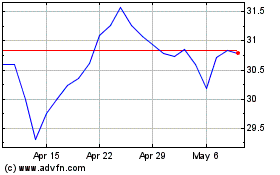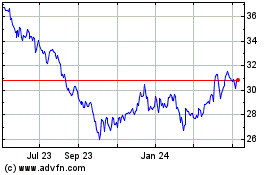Lobbying Charges Up for Kraft - Analyst Blog
September 01 2011 - 12:26PM
Zacks
Kraft Foods Inc. (KFT) reported that it spent
$730,000 during the second quarter 2011 on issues related to
transportation, agriculture, food safety, milk price regulation,
marketing and other matters. The lobbying charges inched up 7.4%
from $680,000 spent during the second quarter of 2010 and 1.4% from
$720,000 spent in the first quarter of 2011.
According to the filing with the House clerk's office on July
20, Kraft lobbied Congress, U.S. Department of Agriculture, the
Office of Management and Budget, the Food and Drug Administration,
the U.S. Trade Representative and other agencies from April through
June.
As a major food producer in the United States, Kraft’s business
is affected by agriculture policy, food safety regulations, trade
policy, and other government activity and regulations. Kraft spends
a lot of money on the political process and focuses on policy
issues that affect its interests.
During 2009-2010, Kraft’s employees and its PAC spent $951,016
on campaign contributions, whereas the company spent $6.4 million
on lobbying in 2009-2010.
One bill they lobbied on included the Safe and Efficient
Transportation Act of 2009, which would have increased the weight
limit for freight trucks, allowing them to transport more in one
load, and would have also provided money to repair bridges,
presumably because of the increased stress caused by heavier
trucks. However, the bill did not become law.
Two other bills Kraft lobbied on, the FDA Food Safety
Modernization Act and the Food Safety Enhancement Act, would have
increased federal authority over food supply and increased the
number of inspections of food processing plants. Both were
supported by Kraft and opposed by small food producers, and neither
became law.
Kraft also received $402.06 million in federal government
contracts in 2010, most of them for grocery resale.
On August 9, Kraft posted robust second-quarter 2011 earnings of
62 cents per share, ahead of the Zacks Consensus Estimate of 58
cents. Management credited the benefits of increased investments in
marketing and innovation, and focus on End-to-End Cost Management
for strong results in the quarter.
The company is also planning to spin off its North American
grocery business to its shareholders and split into two independent
public companies. One would focus on international snack brands,
and the other on its North American grocery business.
Kraft is stated to drive confidence from the belief of
continuing strong business momentum in the challenging environment
of weak consumer and category growth as well as significant input
cost inflation.
We remain encouraged by the company’s investments in quality
upgrades, promotions and marketing as well as initiatives taken to
improve margin and productivity by reducing manufacturing and
overhead costs and enhancing operational efficiencies by
modernizing plants and information systems.
However, higher commodity costs, increased marketing expenses,
competition from private labels and presence of tough competitors
like Unilever Plc. (UL) and ConAgra Foods
Inc. (CAG) concern us.
Currently, we prefer to rate the stock as Neutral. Further,
Kraft Foods holds the Zacks #2 Rank, which translates into a
short-term Buy rating.
CONAGRA FOODS (CAG): Free Stock Analysis Report
KRAFT FOODS INC (KFT): Free Stock Analysis Report
UNILEVER PLC (UL): Free Stock Analysis Report
Zacks Investment Research
ConAgra Brands (NYSE:CAG)
Historical Stock Chart
From Jun 2024 to Jul 2024

ConAgra Brands (NYSE:CAG)
Historical Stock Chart
From Jul 2023 to Jul 2024
